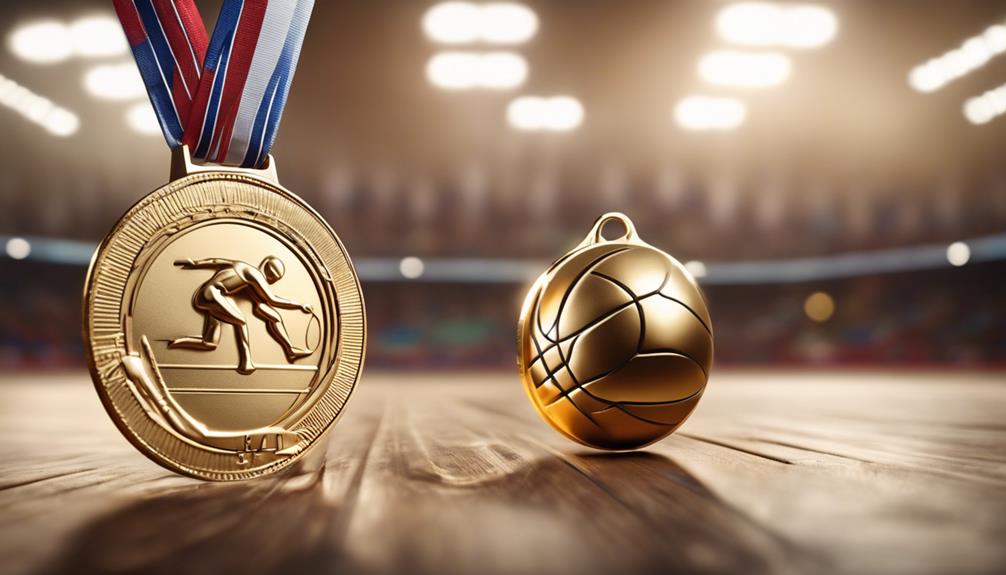Did you know that the first-ever Olympics in 776 BC had just one event, a footrace? It's true! Back then, only freeborn Greek men could take part; women couldn't even watch! Fast forward to 1896 when a guy named Baron Pierre de Coubertin brought the modern Olympics back to life in Athens, Greece. And get this – those iconic Olympic rings we all know and love? They stand for global togetherness! These fun Olympic facts are just the tip of the iceberg – there's a whole world of fascinating Olympic history waiting for you!
Key Takeaways
- The first ancient Olympics had only one event: a footrace called the stadion.
- Women were not allowed to compete or watch the ancient Greek Olympics.
- Dimitrios Loundras, at age 10, won a bronze medal in gymnastics in 1896.
- The Olympic rings symbolize global unity and were designed in 1913.
- London hosted the Olympics in 1908, 1948, and 2012 with unique achievements.
Pigeon Shooting Disaster
Let's talk about a wild moment from the 1900 Paris Olympics – the live pigeon shooting event. Can you believe they actually had this as a competition back then? It's pretty controversial, to say the least.
During this dark moment in Olympic history, almost 300 birds sadly lost their lives.
One name that stands out is Leon de Lunden from Belgium, who clinched the gold by taking down 21 birds. That's quite a feat, but it's also kind of a tough pill to swallow considering the circumstances.
The use of live animals in sports events like this is something we definitely don't see in the modern Olympics. It's a good thing times have changed, right?
One Event Initially
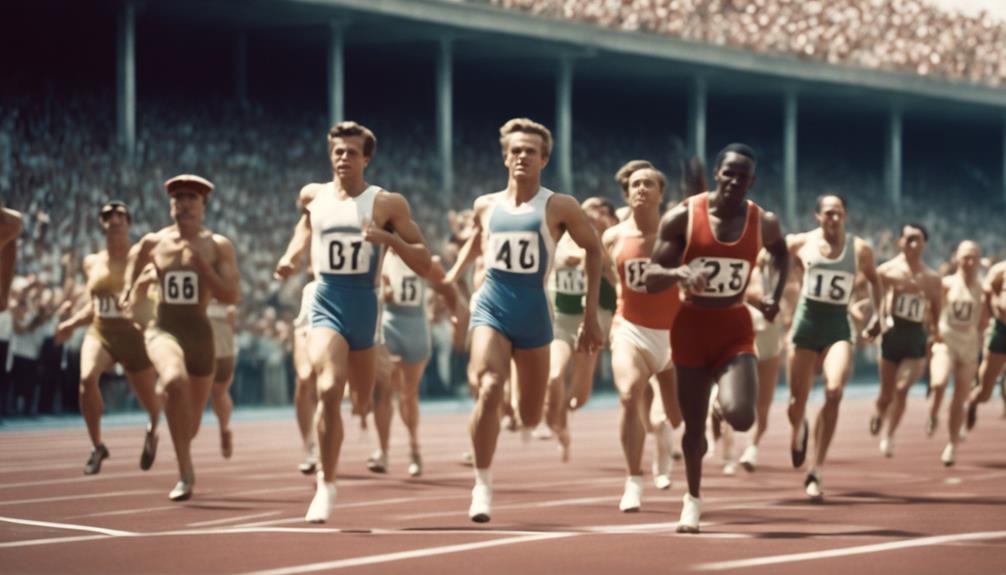
Did you know that the first-ever Olympics way back in 776 BC had just one event?
Yep, it was a footrace called the stadion.
Can you imagine, from a simple race in ancient times to the massive multi-sport extravaganza we have today?
It's incredible how things have evolved over the years!
Sole Ancient Competition
Initially, the ancient Olympics featured only one event, the stadion footrace, marking a modest start to the renowned athletic competition. Imagine this – it all began with runners sprinting around a track that was about 192 meters long. Just one race, that's it! Can you believe it?
The stadion race may seem simple compared to the variety of sports observed in the Olympics today, but back then, it was a big deal. This single footrace event set the stage for what would become the grand spectacle of the modern Olympic Games.
It's pretty cool to think about how the Olympics started with just one exciting race. From that humble beginning, the Games grew and evolved into the massive, multi-sport event familiar with today.
Modern Multi-Sport Spectacle
The modern Olympics have blossomed from a humble beginning of just one event into a vibrant and diverse multi-sport spectacle. Imagine, back in 776 BC, it all started with a simple footrace. But oh, how things have changed! Over time, the modern Olympic Games have evolved to include a wide array of sports and disciplines, showcasing the incredible talents of athletes from around the globe.
From its origins in Olympia, Greece, the Olympics have transformed into a global multi-sport spectacle where athletes compete for medals, embodying the spirit of competition and unity.
- The modern Olympic Games began with a single footrace event.
- This global event has expanded to include a diverse range of sports and disciplines.
- Athletes from all corners of the world come together to compete for medals.
- The Olympics celebrate the spirit of competition and unite nations through sport.
Exclusive Olympic Beginnings
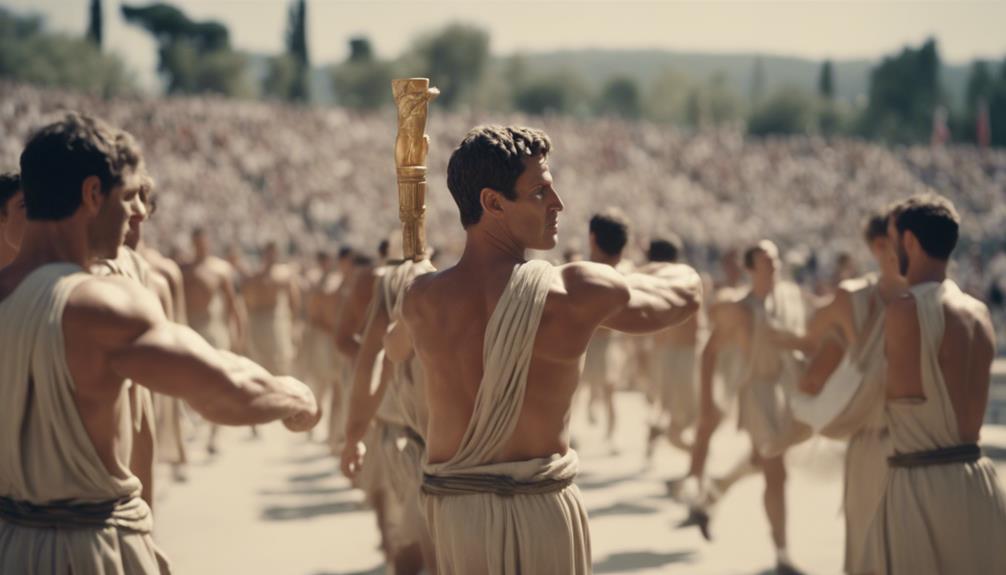
The origins of the Olympics reveal a history characterized by exclusivity towards freeborn Greek men. Back in ancient Greece, the Olympic Games were a big deal, but they were like a VIP club for dudes only. Yup, women weren't even allowed to compete or watch the games. Talk about exclusive, right? It was all about sticking to those strict gender norms and societal rules of the time.
Can you imagine if that was still the case today? The modern Olympics are all about inclusivity and celebrating athletes from all walks of life, regardless of gender. It's pretty cool to see how far we've come from those early days.
It wasn't until 1900 that women were finally allowed to compete in the Olympics. That's a huge shift from the old boys' club it used to be. The Games have definitely come a long way with regards to gender equality. It's awesome to see everyone getting a shot at Olympic glory now!
Modern Olympic Revival
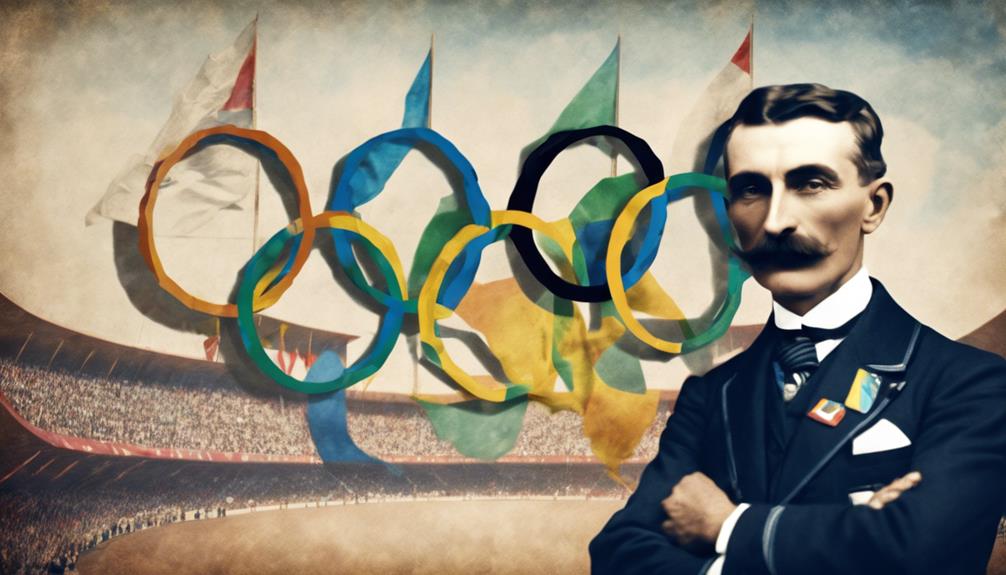
Since its revival in 1896 by Baron Pierre de Coubertin in Athens, Greece, the modern Olympics have become a global celebration of athletic excellence and inclusivity. It all started with a vision to bring nations together through sports.
Here are some cool facts about the modern Olympic revival:
- The first modern Olympics, held in 1896, marked the beginning of this incredible journey towards international unity.
- In 1900, women were finally allowed to compete, breaking barriers and paving the way for inclusivity in sports.
- The Winter Olympics made their debut in 1924, giving athletes a chance to showcase their skills in snowy landscapes.
- The International Olympic Committee, founded in 1894 by Baron Pierre de Coubertin, oversees the Games, ensuring fair play and sportsmanship worldwide.
From the first modern Olympics to the introduction of the Winter Olympics and the focus on inclusivity, the Olympic movement continues to inspire athletes and fans around the globe!
Symbolic Olympic Rings
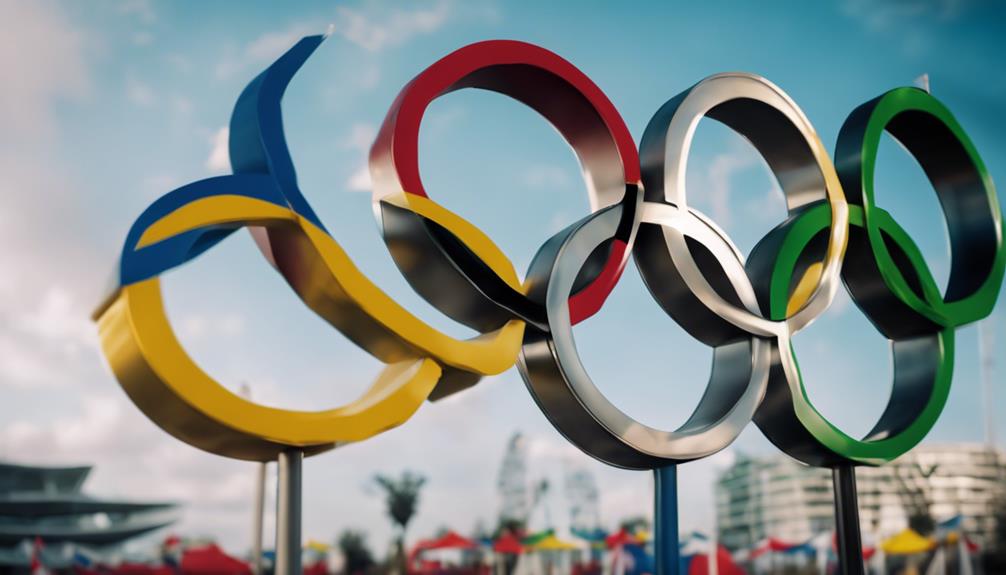
Symbolizing global unity, the Olympic rings were designed in 1913 by Baron Pierre de Coubertin. Each of the five rings represents a continent, showing how the world can come together through sports.
Imagine, the colors of the rings were actually picked from the flags of all participating nations! That's like a colorful mosaic of unity right there. The essential white background behind the rings is vital too; it guarantees that every single country is included and represented, making it a true symbol of togetherness on a global scale.
When you see those iconic rings, think about the athletes from all corners of the world coming together to compete, showing the spirit of international cooperation. It's like a big sports party where everyone's invited!
Olympic Torch Relay
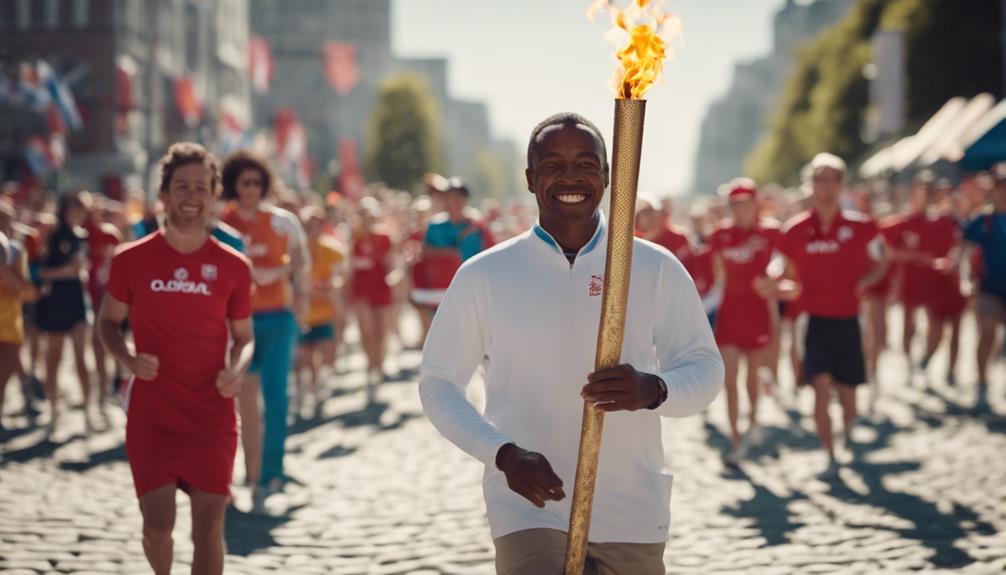
At the temple of Hera in Olympia, Greece, the Olympic torch relay commences. It's a grand tradition where the torch is passed from runner to runner, symbolizing the unity of nations for the upcoming Olympic Games.
The journey of the torch is nothing short of extraordinary:
- The torch doesn't just travel by foot; it has been carried on horseback, boat, and even camel!
- Imagine a torch underwater or in space; yes, it has traveled through such unusual routes.
- If by chance the flame extinguishes, fear not! A backup flame from Greece reignites it, keeping the spirit alive.
- This relay isn't just about transportation; it's a symbol of countries worldwide coming together in the spirit of sportsmanship and competition.
The Olympic torch relay is a remarkable spectacle that showcases the shared values and camaraderie of nations participating in the Games.
First Modern Olympics Participation
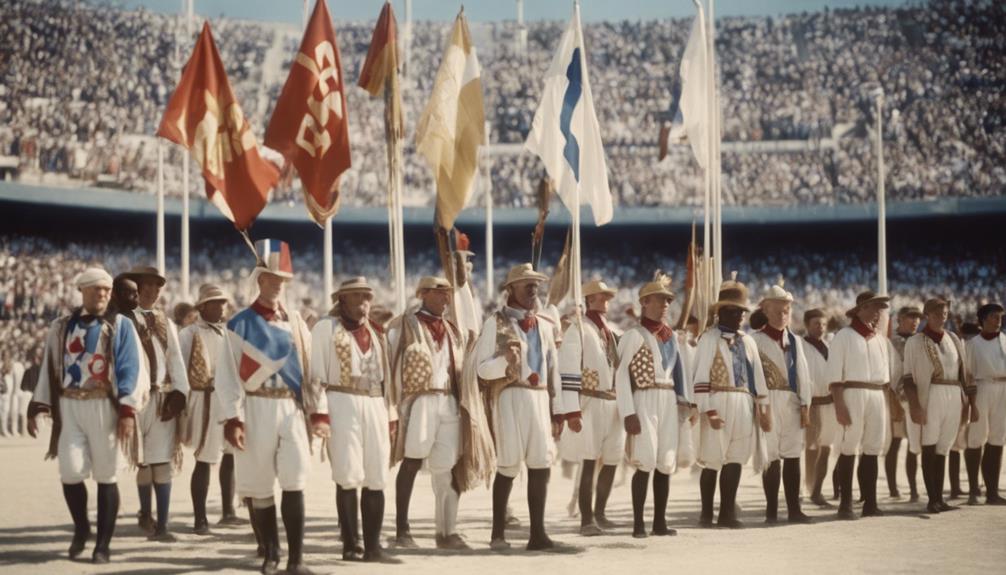
Let's chat about the first modern Olympics participation.
Back in 1896, the Games welcomed athletes from 14 countries, including the USA, Australia, Chile, and 11 European nations.
It's pretty cool to see how the Olympics have grown from those humble beginnings to over 200 countries participating today!
Inaugural Olympic Games
The inaugural modern Olympics in 1896 marked a significant milestone in the revival of the ancient Olympic tradition. These first Olympic Games took place in Athens, Greece, bringing together 14 participating countries from diverse backgrounds.
Baron Pierre de Coubertin, a French educator, was the mastermind behind this grand gathering of athletes, aiming to promote international unity through sports. The event was a global affair, with teams hailing from Europe, Australia, Chile, and the USA.
After a break of over 1,500 years, the ancient Olympic tradition was reignited in all its glory. Over the years, the number of participating countries has skyrocketed, with now over 200 nations competing in the Olympics.
The original Olympics in ancient Greece weren't just about sports; they were part of a festival honoring Zeus, the Greek God of sky and weather. These fun facts show how the spirit of sportsmanship and competition has evolved since the inception of the modern Olympic Games.
Athletes' Nationality Requirements
As the modern Olympics commenced in 1896 with athletes from 14 countries participating, the requirements regarding athletes' nationality set the stage for the global nature of the Games. Back then, 11 European nations, along with Australia, Chile, and the United States, sent their finest athletes to compete in the inaugural modern Olympics. This diverse representation showcased the international appeal of the Games from the very start.
Let's take a closer look at the countries that participated in the first modern Olympics:
| Europe | Americas | Oceania |
|---|---|---|
| Greece | United States | Australia |
| Germany | Chile | |
| France | ||
| Great Britain |
The inclusion of athletes from various corners of the world not only added to the excitement of the Games but also fostered a sense of unity and camaraderie among nations. It's amazing to see how the Olympics have evolved to become a truly global celebration of sport!
Youngest Olympian Record
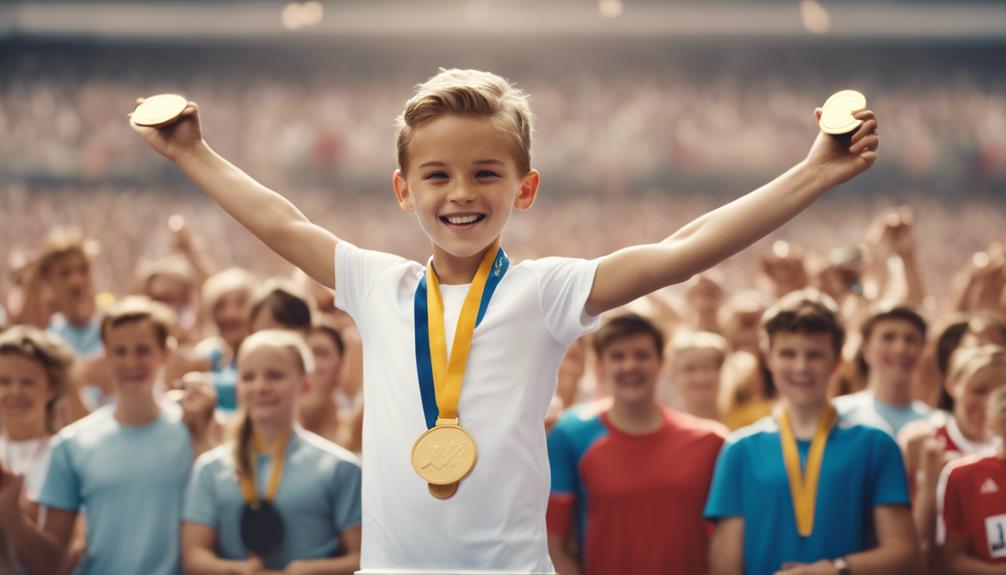
Possessing an impressive distinction in Olympic history, the youngest Olympian on record is Dimitrios Loundras. Imagine being just 10 years old and competing in gymnastics at the 1896 Athens Olympics!
Loundras not only participated but also snagged a bronze medal in the team parallel bars event, becoming the youngest Olympic medalist ever. His incredible journey showcased the early diversity of athletes in the modern Olympic Games.
Even over a century later, Loundras' record as the youngest Olympian still stands tall, reminding us of the remarkable talent and dedication of young athletes throughout Olympic history.
- Dimitrios Loundras competed in gymnastics at the tender age of 10 in the 1896 Athens Olympics.
- He clinched a bronze medal in the team parallel bars event, making him the youngest Olympic medalist.
- Loundras' participation highlighted the diverse range of athletes in the early days of the modern Olympic Games.
- His enduring record as the youngest Olympian underscores the extraordinary abilities of young athletes in Olympic history.
Global Olympic Hosting
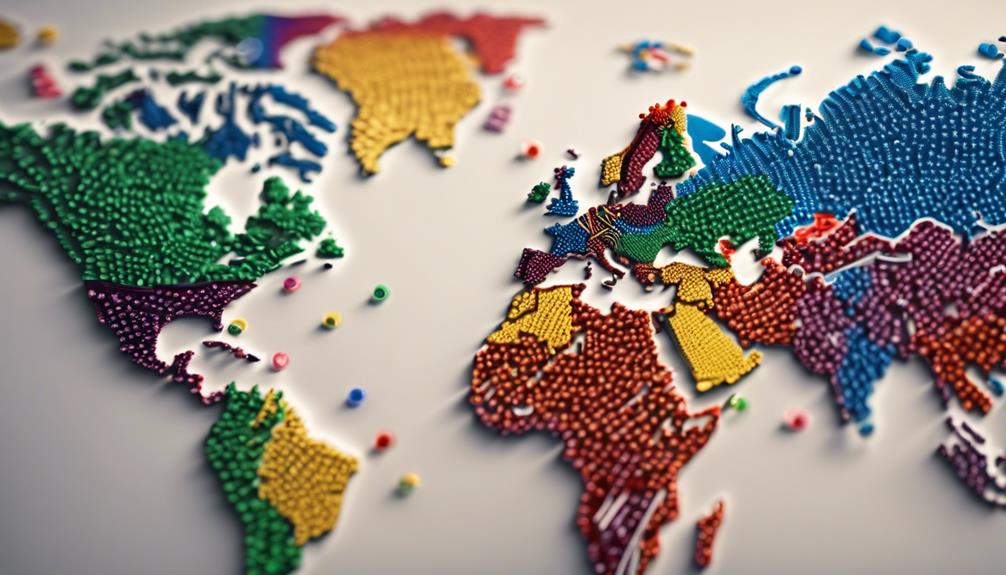
Hey there, did you know that hosting the Olympics has a huge impact on the cities that welcome the Games?
It's not just about the sporting events; there are economic benefits and costs to take into account as well.
Plus, the legacy left behind by hosting the Olympics can be truly remarkable!
Host Cities' Impact
When hosting the Olympics, cities across the globe experience a myriad of impacts ranging from economic boosts to enhanced infrastructure. Here are some key impacts that hosting the Olympic Games can have on a host city:
- Increased tourism: Hosting the Olympics often attracts visitors from around the world, boosting the local tourism industry and bringing in revenue for businesses.
- Global exposure: The spotlight of the Olympic Games shines brightly on the host city, giving it global recognition and putting it on the map for future travelers and investors.
- Long-term benefits: The legacy of hosting the Olympics can include repurposed venues and improved facilities that benefit residents long after the Games have ended.
- Economic development: The social, cultural, and economic impacts of hosting the Olympics can stimulate local economies, driving growth and development in the host city.
These impacts collectively shape the legacy of an Olympic host city and leave a lasting impression on its residents and visitors alike.
Economic Benefits and Costs
Hosting the Olympics globally presents a complex economic landscape with both significant benefits and costs to take into account. On the bright side, the Games bring in economic benefits like job creation, infrastructure development, and increased tourism revenue. However, there's a flip side to the coin.
The costs of hosting the Olympics can skyrocket due to construction expenses, security measures, and potential budget overruns. Just look at Rio in 2016, where the Olympics cost a whopping $13 billion! London in 2012 wasn't far behind, with a budget exceeding $15 billion. Montreal's 1976 Olympics left the city drowning in debt for years, with costs ballooning to ten times the original estimate!
But hey, it's not all doom and gloom. Cities like Barcelona and Los Angeles have shown that the Olympics can be a golden opportunity to boost their economies and improve infrastructure for long-term gains. So, while hosting the Olympics comes with its risks, the potential rewards are definitely worth considering.
Legacy of Hosting
The legacy left by hosting the Olympics globally is characterized by long-lasting impacts on various aspects of the host city's infrastructure, economy, and community. When a city takes on the monumental task of hosting the Olympics, it's not just a few weeks of excitement; it's a transformation that lasts for years to come.
Here are some key points to understand the legacy of Olympic hosting:
- Infrastructure: The host city invests in building state-of-the-art stadiums, transportation systems, and accommodations that benefit the city long after the Games are over.
- Impact: Hosting the Olympics boosts the local economy through increased tourism, job creation, and international investments.
- Global Exposure: The world's eyes are on the host city during the Olympics, leading to a surge in sports interest and participation in the country.
- Community Benefits: Olympic venues are repurposed to serve the local community, providing spaces for recreation, events, and cultural activities.
The legacy of hosting the Olympics isn't just about the Games themselves but about the lasting positive changes they bring to the host city and its people.
London's Unique Achievement
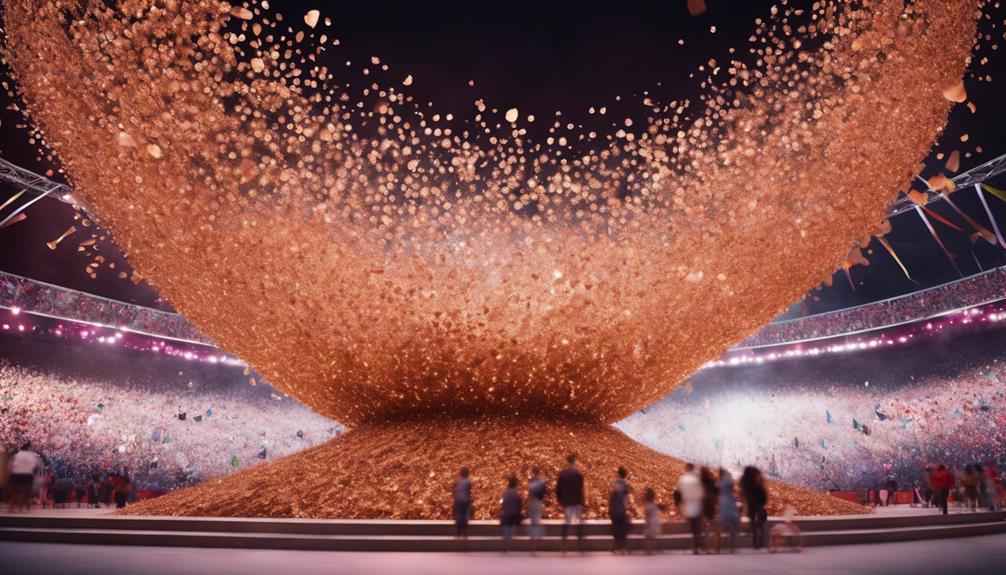
London achieved a remarkable feat by hosting the modern Olympics three times, in 1908, 1948, and 2012. That's pretty impressive, right? But what makes London's Olympic history even cooler are the unique events and milestones they've had.
In 2012, London shook things up with the opening ceremony directed by Danny Boyle. It was like a blockbuster movie coming to life right there in the Olympic stadium!
Another awesome thing about London's 2012 Olympics was that it was the first time every single country participating had female athletes representing them. Girl power all the way! And let's not forget about the legendary Usain Bolt. The fastest man on the planet sprinted his way to gold in the 100m and 200m races, leaving everyone in awe.
London really knows how to make the Olympics unforgettable with its mix of history, innovation, and incredible athletes. Who knows what surprises they've in store for the next games?
Frequently Asked Questions
What Other Interesting Facts Are There About the Olympics?
Want to know more about the Olympics? The Games have unique traditions, like the Olympic torch relay and the symbolic lighting of the cauldron. Athletes from around the world unite to compete in this global event.
What Are 5 Interesting Facts About the Ancient Olympics?
So, you want to know about the ancient Olympics, huh? Well, here's a scoop: only Greek dudes got to play, no ladies allowed! Events were crazy long, like a six-month marathon. Wild times!
What Is the Age of the Youngest Olympian?
The youngest Olympian in history was Greek gymnast Dimitrios Loundras, who competed at the age of 10 in the 1896 Athens Olympics. His participation highlighted the early lack of age restrictions in the Games.
What Are Two Facts About the Special Olympics?
The Special Olympics embody inclusivity and empowerment, welcoming athletes with intellectual disabilities worldwide. Athletes receive year-round training and compete in various sports. Over 5 million athletes from 172 countries participate, fostering acceptance and unity.
Conclusion
So there you have it, folks! The Olympics are like a giant puzzle with pieces from all over the world coming together to create something amazing.
It's a bit like watching a fireworks display – each event lighting up the sky with excitement and energy.
Who knew there were so many quirky and fascinating facts hidden behind the scenes of the games? Keep exploring and you'll uncover even more Olympic gems!

